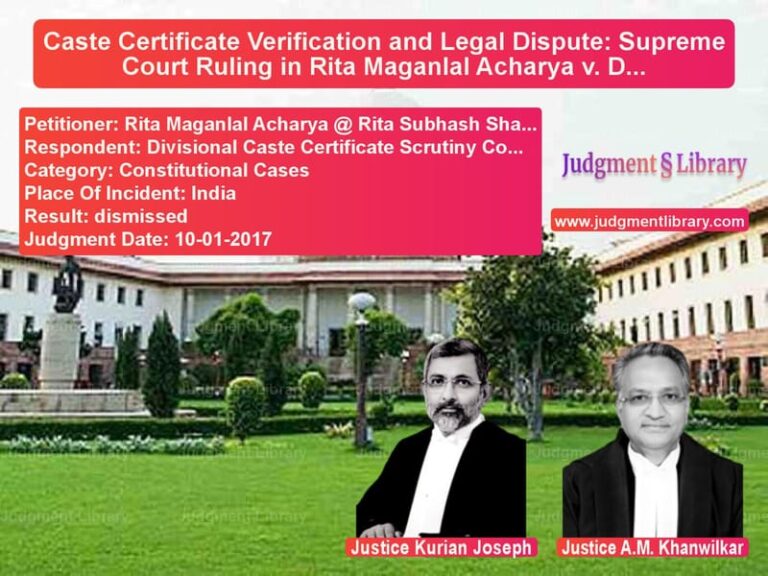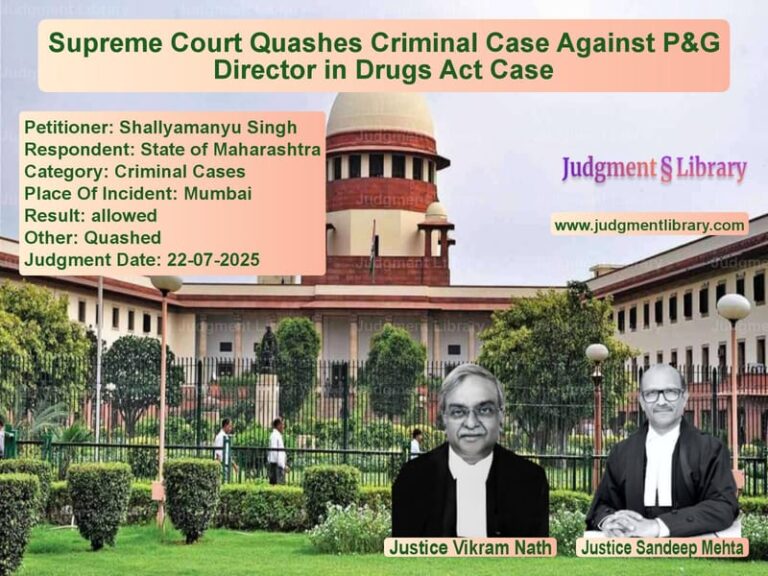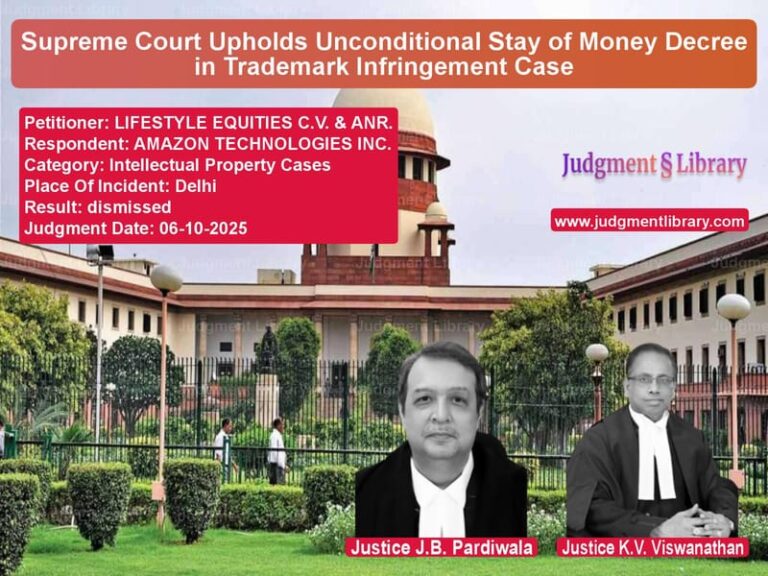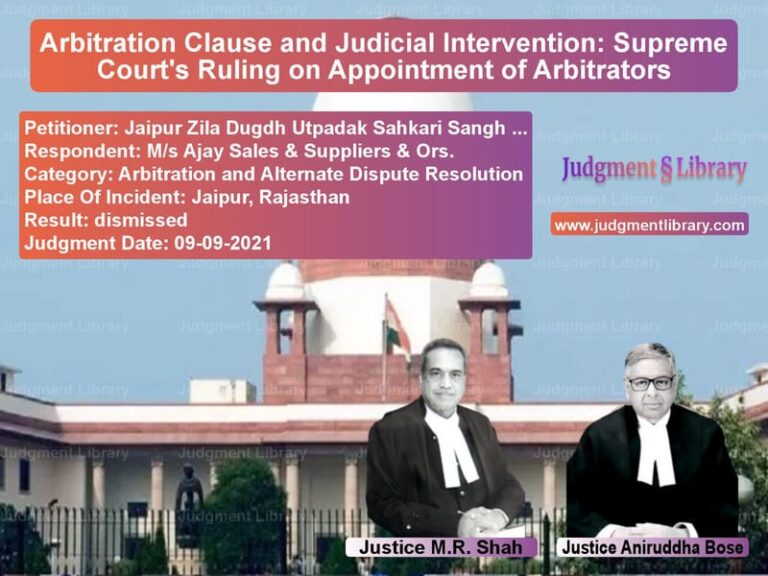Supreme Court Upholds High Court’s Order in Tenant Eviction Case: Ambika Murali v. Tmt. Valliamal
The Supreme Court of India recently delivered a crucial judgment in the case of Ambika Murali v. Tmt. Valliamal & Anr., affirming the High Court’s decision to condone the delay in filing a petition against an ex-parte eviction order. The ruling highlights the importance of procedural fairness in landlord-tenant disputes, ensuring tenants are given reasonable opportunities to defend themselves.
Background of the Case
The appellant, Mrs. Ambika Murali, was the landlord of a property in Tamil Nadu. She had filed a Rent Control Petition (RCOP) Nos. 2270 and 2271 of 1994 against the respondents, Tmt. Valliamal and another tenant, seeking their eviction on the following grounds:
- Willful default in rent payment.
- Unauthorized subletting of the property.
- Creation of additional accommodation without the landlord’s consent.
During the proceedings, the Rent Controller issued a conditional order on February 10, 2004, directing the tenants to deposit rent arrears. The respondents failed to comply, leading to an ex-parte decree of eviction on February 27, 2004. The eviction order remained unchallenged until the court amin (officer) arrived to take possession of the shops, at which point the tenants filed an application to set aside the ex-parte decree.
Legal Issues Considered
- Whether the delay of 175 days in filing an application to set aside the ex-parte eviction order was justifiable.
- Whether the tenants were given a fair opportunity to defend themselves in the eviction proceedings.
- Whether the High Court had correctly exercised its revisional jurisdiction in condoning the delay.
Petitioner’s (Ambika Murali) Arguments
The landlord argued:
- The tenants were aware of the eviction order but deliberately delayed filing a petition to set it aside.
- The delay of 175 days was excessive and unjustifiable.
- The tenants had a history of defaulting on rent and misusing the legal process to prolong their stay.
- The High Court had exceeded its jurisdiction by interfering with the Rent Controller’s decision.
Respondent’s (Tmt. Valliamal & Anr.) Arguments
The tenants contended:
- They became aware of the eviction order only when the court amin arrived to take possession.
- The delay was due to a lack of formal communication about the ex-parte decree.
- They had a meritorious defense and should be allowed to contest the eviction case on merits.
- The High Court correctly exercised its discretion to ensure justice was served.
Supreme Court’s Observations
On the Justification of Delay
The Supreme Court agreed with the High Court’s reasoning that the delay in filing the application was not deliberate:
“The delay of 175 days in filing the petition has been satisfactorily explained. Procedural fairness requires that tenants be given an opportunity to present their case.”
On the High Court’s Revisional Jurisdiction
The Supreme Court held that the High Court was justified in condoning the delay:
“The High Court, in its revisional jurisdiction, has acted within legal limits. The order allowing the tenants to contest the case does not prejudice the landlord’s rights.”
On the Eviction Proceedings
The Court emphasized that eviction cases must be decided on merits and not on procedural technicalities:
“Eviction proceedings should be resolved on substantive grounds, not merely on account of procedural lapses.”
Final Judgment
The Supreme Court ruled:
- The High Court’s decision to condone the 175-day delay was upheld.
- The ex-parte eviction order was set aside.
- The case was remitted to the Rent Controller for fresh adjudication on merits.
- The respondents were directed to pay Rs.5,000 as costs to the appellant.
Significance of the Judgment
- Ensures Procedural Fairness: Reinforces that tenants should not be evicted without an opportunity to present their case.
- Limits Judicial Overreach: Affirms that revisional courts must act within their jurisdiction while ensuring justice.
- Protects Landlord-Tenant Rights: Balances the rights of landlords with procedural safeguards for tenants.
Conclusion
The Supreme Court’s ruling in Ambika Murali v. Tmt. Valliamal is a landmark decision in landlord-tenant disputes. By upholding the High Court’s decision, the Court reaffirmed the importance of procedural fairness, ensuring tenants are not evicted without due process. The case sets a precedent for balancing landlord rights with the tenants’ right to a fair hearing.
Petitioner Name: Mrs. Ambika Murali.Respondent Name: Tmt. Valliamal & Anr..Judgment By: Justice Ajay Rastogi, Justice Abhay S. Oka.Place Of Incident: Madras, Tamil Nadu.Judgment Date: 07-10-2021.
Don’t miss out on the full details! Download the complete judgment in PDF format below and gain valuable insights instantly!
Download Judgment: mrs.-ambika-murali-vs-tmt.-valliamal-&-anr-supreme-court-of-india-judgment-dated-07-10-2021.pdf
Directly Download Judgment: Directly download this Judgment
See all petitions in Landlord-Tenant Disputes
See all petitions in Specific Performance
See all petitions in Damages and Compensation
See all petitions in Judgment by Ajay Rastogi
See all petitions in Judgment by Abhay S. Oka
See all petitions in dismissed
See all petitions in Remanded
See all petitions in supreme court of India judgments October 2021
See all petitions in 2021 judgments
See all posts in Civil Cases Category
See all allowed petitions in Civil Cases Category
See all Dismissed petitions in Civil Cases Category
See all partially allowed petitions in Civil Cases Category







